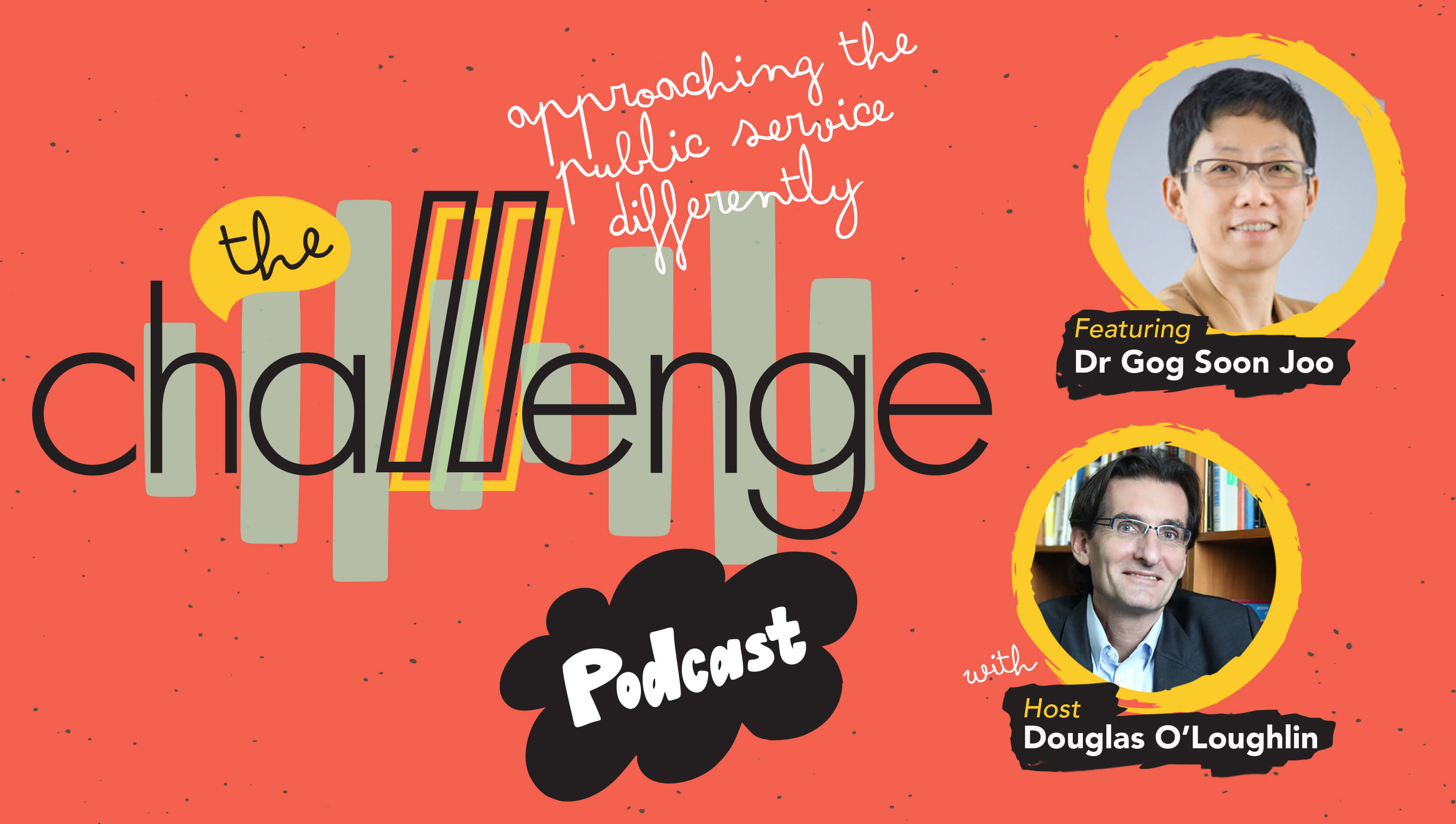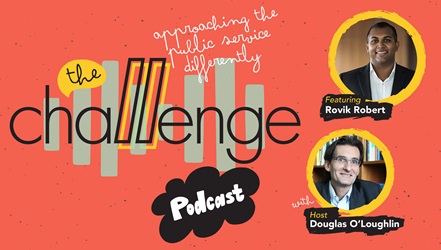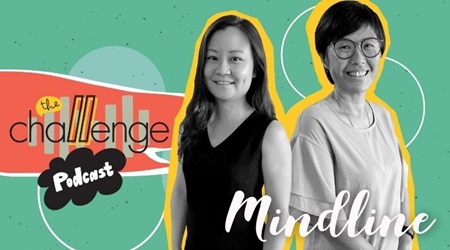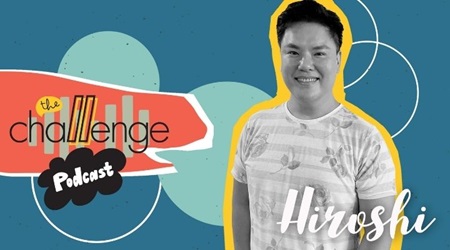Dr Gog Soon Joo On Being Future Ready

For this episode, Challenge hears from Chief Futurist, Dr Gog Soon Joo. We find out what this role entails and why she thinks the increasing use of Artificial Intelligence does not signal the end of jobs for humans.
Transcript
Host: Douglas O’Loughlin
Audio: Fei
Douglas: Hello and welcome to the Challenge podcast where we discuss all things public service in Singapore. I'm your host, Douglas O'Loughlin, a consultant in organisation transformation and a former public officer. And for this podcast, we'll be speaking to public officers on a wide range of backgrounds.
Our guest today is Dr Gog Soon Joo, who's with SkillsFuture Singapore (SSG). She is also the Chief Skills Officer and Chief Research Officer. Dr Gog leads a team of data experts and futurists and they develop job skills, insights for individuals, businesses, education and training partners, as well as policymakers in Singapore. Dr Gog, so nice to meet you! And thanks for being on the show.
Soon Joo: Thank you, Douglas. Please call me Soon Joo.
Douglas: Okay, Soon Joo. Well, could you start by telling us about your surname because it is quite unusual.
Soon Joo: It happened when my dad arrived in Penang, Malaysia from China. There was an administrative error at the British clerk. When you look at the keyboard, you see the letters ‘g’ and ‘h’ next to each other. So instead of typing G-O-H, the clerk typed G-O-G. So we just inherited it and it's pretty cool.
Douglas: So there must be something about you and interesting names and titles because we were talking about your title – Chief Futurist. How did that come about? And what do you actually do in that role?
Soon Joo: In 2018, SkillsFuture Singapore, then led by Ng Cher Pong, wanted to set up a Futures Office to better understand the changing nature of work, the changing job contexts, changing skills, and new habits and behaviour towards learning. The aim was to inform our mission to help Singaporeans be lifelong learners. So we set up our small team to study lead indicators and look at sources of data to measure and monitor change. Of course, we also seek out global and local partners to prototype solutions. So if it's a successful solution, we mainstream it within SSG. So that's how we started. And, of course, Cher Pong attracted me by giving me this sexy title.
Douglas: You have other titles as well: Chief Skills Officer, Chief Research Officer. How does that all fit together?
Soon Joo: I took over the role of Chief Skills Officer in 2019. The mandate given to me was to transform the way SSG identifies the job and skills needs for our economy, and to enhance the signposting to citizens, enterprises and our education and training institutions. As you know, we give SkillsFuture credits to all Singaporeans aged 25 and above. So we ask ourselves, how can we better help them to make informed decisions? If we can identify the skills and signpost them, they can make better, informed decisions. So my team was to transform that whole process and more accurately identify the job and skills needs and disseminate that information.
So over the last year and a half, my role as a Chief Skills Officer has been to create an innovative culture among my team so that they can leverage on databases to develop job skills insight. We also work with multidisciplinary researchers to better understand skills use at work, skills development approaches and develop the next generation of predictive modelling for job skills. We incorporate R&D into our work. That's why all these different titles stack up.
Douglas: Wow, it's so impressive. It's a very holistic approach.
Soon Joo: We're humbled by the opportunity to do this work.
Douglas: Yeah, it's exciting, and it's good to go behind the curtain of SkillsFuture – there's obviously a lot more going on than just offering training for people.
Soon Joo: That's right. It's a huge team of about 450 doing different things. Some are designing programmes for individuals, some are designing programmes for enterprises, while others are dedicated to building up the capability of our education and training sectors, like the Institutes of Higher Learning. We work very closely with polytechnics, universities, ITE and private education providers. So it’s really looking at skills anticipation, looking at job content changes: What are the new jobs coming into the economy? How can we get people on board and reskill?
Douglas: How has COVID-19 affected your work?
Soon Joo: I think we were all knocked off our chairs. We had big plans in 2020, and suddenly everybody's going to war. How am I going to support the SGUnited Jobs and Skills initiative? How do we keep people in their jobs? How do we create learning very quickly? So overnight, we had to pivot and ask ourselves, what sort of data and insights can we create? Where are the jobs? How can we show people these are the jobs available in Singapore?
So we produced weekly data analysis for my colleagues at SSG, a sector agency, and the polytechnics and universities so they could create more relevant SGUnited Jobs and Skills courses and also determine how we could better deploy people into specific jobs. We had to create a “job skills recommender” to match those with the necessary skills with in-demand jobs in their sector and those in the service sector. It was to give them a chance to evaluate their options and ask themselves, what kind of training should I pursue?
And I think it gives people hope that the situation is not so dire, that there are options to consider. So yes, COVID-19 affected our plans. It delayed our plans by a year, but we are okay, we are back on track now.
Douglas: What are the more common tools and things that you use and skills that you and your team use? Especially if you can take the ones that all of us probably could use more often?
Soon Joo: I would name three skills I use most frequently. One of them is learning agility. At an individual level, it is a matter of how I can learn quickly in order to apply knowledge to my work. At a higher or group level, it is about creating a learning environment for my team to be able to learn, create a minimum viable product feedback loop and then come back again to enhance our solution.
The second skill is about developing people. And this has become more and more important because we're living in an uncertain world and there's no playbook. We need to create things on the go. How do we help individuals and come together to co-create especially when our team members have taken on new job roles?
The third skill is customer-centricity or customer orientation. At the end of the day, the Public Service is trying to serve the citizens. How do we determine what they really need? So there is a conscious effort to find out the needs of the end user and our partners. I think it is important to have those conversations and engagement, to push out products or services and get feedback and make improvements.
Douglas: What products out there are available for public officers that you think would be helpful for them to know about?
Soon Joo: The three skills I just mentioned were extracted from the 16 Critical Core Skills for the future economy. This is something SSG launched last August. And there are three baskets of these Critical Core Skills. The first basket is called staying relevant. This is for the individual and there are five skills in there. The second basket is interacting with others. There are six skills there. The last basket is called critical thinking, which has another five skills.
We took about six months to come up with this. We consulted 28 industries, close to 130 chief HR officers and CEOs at the C-suite level to ask them to deliberate the skills the future workforce would need. And these 16 skills are what they mentioned. I would strongly urge Public Service officers to take a look at this. Just Google “Critical Core Skills Singapore”. You will see the set of 16 skills. I think it's really important for us to be aware of them, be conscious about developing ourselves and help our colleagues to learn.
Also since last year, we started embarking on the development of Singapore's job skills repository. It is a database to capture the future and in-demand jobs and skills of our economy. The base of it is a 34 skills framework that was developed since 2016, which we have converted into a database. We are updating it dynamically using big data drawing from job posting databases, CV databases, including learning consumption databases. This would allow us to update and know what the new job skills are and how jobs are changing. This will be available publicly from 2022. We are trying to create dashboards and query engines for individuals, enterprises or education training institutes to be able to access the updated skills.
And earlier this year we completed Singapore's first skills taxonomy. It is a database of skills with different hierarchies to explain the top-level skills all the way down to the kind of tools and applications that each job role would need. I think this is quite fantastic and exciting. But more importantly, I think the skill taxonomy would allow SSG to constantly be more precise in how it analyses job postings and to understand how job content is changing because certain tasks can be automated now with turnkey technology solutions.
Douglas: I do think that a lot of times when we think about the future of work, there is a common narrative that AI will take over many jobs. Can you speak a little of what you see as the reality in the future about the role of AI in the workplace? And what that means for those of us who are still working?
Soon Joo: Yeah, this is a most frequently asked question. I would say that yes, it is true that today, there are AI algorithms available to read every single job task and assign an index to determine if a task can be automated, and how and with what kind of AI tool.
But I want to qualify that it is less likely for whole jobs to disappear. It is more likely that there will be tasks that are better off augmented by machines. I’ll give you an example. Recently, we deployed software as a service platform to enhance the way we use and manage data. Instead of scouting around and coming up against a shortage of data engineers, we used that platform. We pay for the service and reduce the need to have data engineers on the fly. The whole platform allows us to be more nimble and quickly launch our job skills repository in the speediest time. So I think you can see that the advantage we have by using this AI platform, is to allow us to do our work better and faster. So I think we should constantly be aware of the turnkey solutions, the technological solutions that allow us to plug and play very quickly, to prototype some solutions. I think this is very, very important for all of us in the Public Service.
From the conversation we have with employers, the desired workforce profile is one who can develop insights and create better solutions. And to do that I think we need to augment our work with technology. So don't be afraid. I think you just have to learn what's available, and try and test it out.
Douglas: I like this vision of the future. It totally makes sense that actually, technology can make our lives easier. So what would you recommend to listeners who have not quite decided what to do to become more future ready, so to speak?
Soon Joo: I would recommend three areas of learning. And the context is that we're going to live longer, we’re going to go through different life-stage changes and have different needs in terms of career learning. One, I think it is very important for us to learn how to plan for our career and lives.
A lot of us don't pay attention to this. We switch jobs and try to find a way to be promoted. I think it's very important for us to have the ability and skills to plan and chart our careers. What does it mean to us as we go through different life stages? I think we need to constantly rethink and evaluate our options and think about what is important to us at a given point in time.
So once we have that direction and rough plan, it is easier to decide which areas to invest in. How do you reskill? Do you need to go for certain type of training that will allow you to achieve your various career aspirations?
But career planning doesn't mean it's always about going for courses. It can be about reading books, talking to people. I think the Public Service Division has launched something quite fantastic with its Public Service Career Coaching Network. Talk to somebody, have a chat with a career coach. I think that's a very good start.
Second, I think it's very important to have a good handle on digital fluency. Understand the technology around us. I attended computational thinking twice: One on edx.org and the other on Coursera. They are different – one was by Harvard and the other by Microsoft – and they came from different angles. We are living in a digital era, we need to know the logical operations.
What is the Internet? How does it work? What does an IP address mean? What is social media? I think we need to understand this so that we can better operate in a digital environment. So if you have time, go online and sign up for these courses. You can use the SkillsFuture credits for those curated by SSG.
The third area is that everyone has to be a change leader. So if you can, attend courses or learn how to initiate change and how to manage transformation at the workplace. It's never about technology or deployment. I think a large part of this is initiating change and managing it. It is about helping our peers and colleagues understand why we need to change, overcome our fears and move together.
It takes a lot of persuasion and management of this psychological barrier. So I think going for courses, learning about change leadership and change management is essential.
Douglas: Would making TikTok videos count as digital fluency?
Soon Joo: Why not? I think all these are digital platforms that are easily available on mobile phones. I think we should just try them. And once you learn a new skill, you would think about where to apply it.
Douglas: How can there be a better match between what people have upgraded themselves with and how an organisation can get them to use those skills so they don’t fade away?
Soon Joo: I think that's a very good question. I would say the workplace is the best place to develop and use skills. And as a reporting officer, or superior, what we can do is to think about how can we design small packages or projects that allow our teams to work, learn and deliver results very quickly. So “work learn” packages with very clear deliverables in a fixed timeline. So you think, okay, I have to deliver this by a specific date. I don’t know how to do it, so I will have to learn along the way. So in my team at SSG, we do this all the time.
We do very short projects with two- or three-week deadlines. I call this working on a part-time basis because among our other tasks, we know that in three meetings, we are going to complete this. So different team members do the background work, come together for a 45-minute huddle, split up and regroup. And we know that by the end of the third meeting, we would complete a certain task. So I think officers would find it very exciting because they can learn and perform, and it really motivates them to learn very fast as a team.
I will also share a particular programme SSG has launched. It is called the National Centre of Excellence for Workplace Learning. It is a network of Institutes of Higher Learning that supports enterprises across Singapore to develop the capability to facilitate workplace learning. So what this network does is to help certify a thousand local companies that have the capability to do so.
And I think this initiative is also relevant for the Public Service. If every workplace is a learning organisation that supports employees’ learning, the positive impact will be amazing. I think learning is not just the role of the HR or Learning & Development teams, it’s everyone’s responsibility.
Douglas: You're also correcting some misperceptions. I think in the old days, our bosses were supposed to develop us or plan our careers. That's not really the way it works. Any other misconceptions you think people have about what the future will look like?
Soon Joo: A lot. Thomas Friedman has a book called Thank You For Being Late. If I’m not wrong, it was published in 2016 or 2017. In one chapter he talks about his interview with Google ex CEO, (Eric) “Astro” Teller. I actually disagree with what Astro Teller says but I just want to quickly describe a graph that he sketched out for Thomas Friedman.
In the graph, he refers to a curve, a very light curve, gradually sloping upwards. This represents human anxiety about change. And there is another curve, which represents the development of technology, which is on a steep path up. I disagree with this graph because it is not about pitching humans against technology. Behind technology’s exponential growth is a group of very brave people who dare to take charge and use a technology to solve a problem or create new solutions.
So I think, we should not be fearful. Hop from the curve of anxiety to the curve of technology and see what we can use very quickly. Once we stay on the curve of technology, we are okay, we're less anxious about not doing anything. So taking action on that front is important. So the point here is not to pitch technology against humans. It is about taking action versus not taking action.
Douglas: So we started with admiring your job title of Chief Futurist, and I think almost everyone would love to be a futurist. What tips would you have for aspiring futurists?
Soon Joo: All of us can be futurists because the future is created by us. It is not a destination that is waiting to be created. So I will give three tips. One is to stay curious. Read widely, get involved and be helpful. Because once you offer help and get involved in some activity, you never know what you're going to learn. And that connection is very important.
Second is to be trans-disciplinary. There is always a bias of where we come from and the kind of field of study we practice. It frames the way we look at things and issues. So I think it's important to learn widely. And sometimes, good ideas and insights may come from non-related views that allow us to frame our perspective from different angles. And we may suddenly realise that there is a better solution somewhere else.
Third, I think it's very important to build our network across different fields. LinkedIn is a very convenient place to start. My Future Office team and I use it a lot because that's where we curate experts and partners from across the world. We write to people and say, Hi, we're from SkillsFuture Singapore. Can we talk to you about this? Or can you be our validation panels when we need advice on this? And typically, people are very friendly. We expect a 15-minute chat, and they give us 45 minutes. So build a network, not just within your closed circuit. Have loose, seemingly weak networks.
Douglas: It’s nice how you break it down for us and you have really demystified the future quite a bit, at least for me, and I hope for those of you listening to this. And there are so many things we can do.
I remember working with an organisation years ago where every Monday, somebody in the team would be assigned to read a magazine. It was always something seemingly unrelated. And we picked out articles that would be about finance, HR or something else. So it doesn't have to be super complicated.
Soon Joo: Take charge of your own career and learning. Don't leave it to chance or let someone else plan for you.
Douglas: It's a great reminder. So thanks so much. Thank you for making the future look a little brighter for us.
Soon Joo: Thank you, Douglas.
Douglas: Thank you for listening to this podcast. I’m your host Douglas O’Loughlin. Follow us for new episodes, and follow psd.gov.sg/challenge for more public service stories.

To hear more conversations like this, follow the Challenge Podcast on Spotify.
- POSTED ON
Nov 23, 2021
- TEXT BY
Keval Singh
-
Season 1
Charting Your Career Paths
-
Season 2: Mental Wellbeing
Mindline.SG and the Road To De-stigmatising Mental Health Issues
-
Season 2: Mental Wellbeing
The Case for Employee Wellbeing









